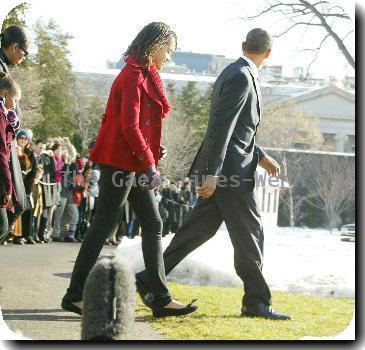Nigerian man charged with trying to blow up US airliner says little during 5 minute hearing
By Ed White, APFriday, January 8, 2010
Christmas terror suspect says little in court
DETROIT — A young Nigerian man, wearing a white T-shirt and tennis shoes, did not speak much Friday during his first public court hearing to face charges of trying to ignite a chemical-laden explosive on a U.S. airliner on Christmas Day.
Umar Farouk Abdulmutallab gave a one word answer — “yes” — when asked whether he understood the charges against him. Magistrate Judge Mark A. Randon entered a not guilty plea for the 23-year-old, who could face up to life in prison on the most serious charge — attempting to use a weapon of mass destruction.
Authorities say the young Nigerian with al-Qaida links was traveling from Amsterdam to Detroit when he tried to destroy the Northwest Airlines plane carrying nearly 300 people by injecting chemicals into a package of explosives concealed in his underwear. The failed attack caused popping sounds and flames that passengers and crew rushed to extinguish.
During his arraignment on Friday that lasted less than five minutes, Abdulmutallab stood at the podium along with Assistant U.S. Attorney Jonathan Tukel and defense attorney Miriam Siefer and answered a few questions in English from the judge.
The longest answer came when the judge asked if he had taken any drugs or alcohol in past 24 hours. Abdulmutallab answered: “some pain pills.” Siefer then said he was competent to understand the proceedings. Abdulmutallab, who is being held at a federal prison in Milan, Mich., had been treated at a hospital for burns after the attack.
His attorneys then waived the reading of the indictment, and Randon entered the not guilty plea. It is routine practice in federal court for the defendant to allow the judge to enter a plea on his behalf rather than say anything himself.
President Barack Obama’s counterterrorism adviser, John Brennan, has said Abdulmutallab would be offered a plea deal in exchange for valuable information about his contacts in Yemen and elsewhere.
After the hearing, one of Abdulmutallab’s attorneys, Leroy Soles, declined to talk about the case.
“It’s just too soon in the process to make any comment,” Soles said.
Maryam Uwais, a lawyer in Nigeria, and Mahmud Kazaure, a lawyer from Maryland, told The Associated Press before Friday’s arraignment that they were sent by Abdulmutallab’s family to observe the hearing. Neither have a role in the case, but both spoke briefly with the suspect’s legal team. They declined to further comment.
At least one passenger from Flight 253 attended Friday’s hearing. Hebba Aref, a Detroit area native now working as a corporate lawyer in Kuwait, said she sat six rows in front of Abdulmutallab on the plane.
Aref, who drew international attention last year after being refused a seat directly behind then-Presidential candidate Obama at a Detroit rally because she was wearing a headscarf, said she came Friday because Abdulmutallab “changed my life.”
“I just wanted to see him again,” the 27-year-old told reporters outside the courtroom following the hearing. “It’s a historic moment, and I want to be part of it.”
President Barack Obama considers the Christmas attack an attempted strike against the United States by an affiliate of al-Qaida. But he also has said the government had information that could have stopped Abdulmutallab, but intelligence agencies failed to connect the dots.
U.S. investigators have said Abdulmutallab told them he received training and instructions from al-Qaida operatives in Yemen. His father warned the U.S. Embassy in Nigeria that his son had drifted into extremism in Yemen, but that threat was never fully digested by the U.S. security apparatus.
Earlier in the day, authorities set up metal barricades outside the courthouse and limited foot traffic in the area. A protester stood holding a sign that read: “No U.S. Rights For Terrorists.”
About 50 men and women identifying themselves as Detroit-area Muslims chanted “We are Americans” as they marched behind metal barricades outside the courthouse to denounce terrorism. About a dozen of them carried U.S. flags or signs with messages such as “Not in the name of Islam.”
Four Muslims who were part of the protest performed Friday prayers in the court’s small museum located on the first floor. Protest organizer Majed Moughni said it was important to take time for Islam’s most important prayer even with the events of the day.
“We have prayer rugs outside in the car. We could have done a show for the media,” protest organizer Majed Moughni said. “We’re doing this for God.”
____
Associated Press writers Mike Householder and Jeff Karoub contributed to this report.
Tags: Africa, Barack Obama, Detroit, Michigan, Middle East, Nigeria, North America, Terrorism, United States, West Africa, Yemen



